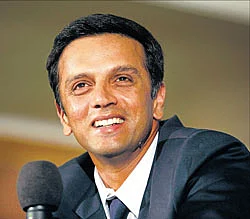Rahul Dravid has captured the imagination of the cricketing world right through his dignified journey as a cricketer. In Australia and in England, the 39-year-old is both loved and respected, as these extracts from a few newspapers will bear testimony.

Sydney Morning Herald: Admiration for Dravid, one of the great batsmen of his generation, will long endure in Australia, never mind that its insatiable fast bowlers ushered him into retirement.
The image of Dravid with arms raised and sweat dripping off him at Eden Gardens in 2001 after his 376-run partnership with VVS Laxman is burned in the memory, not just because it calls to mind Steve Waugh's fateful decision to enforce the follow-on, but because it earned Dravid Australia's respect.
Dravid is not an apologist for Indian cricket's problems; indeed, he has spoken of the need for his country to develop a resilient Test team that can be successful abroad. Few sportsmen display much curiosity about lives outside their own; Dravid does.
At age 39, the time is undoubtedly right for Dravid, the batsman, to call stumps. But at a critical time for cricket, the game cannot afford to lose him.
The Guardian: To talk of Dravid's ability tells only half the story. He exhibited greatness at its most humble, and is one of the most impressive men to play the game: dignified, fair-minded, eloquent (he never used a ghostwriter), gentle, yet tougher than we will ever realise. A Gary Cooper for the new millennium; the kind of man you'd want your son to grow into. Sourav Ganguly observed that Dravid had the eerie habit of almost always saying the right thing. He pretty much always did the right thing, too.
The Independent: Dravid will be remembered as the man in the middle of India's great triumvirate. VVS Laxman and Sachin Tendulkar may have performed feats more easy on the eye, but Dravid is the ultimate team man. If it meant dropping anchor, down it went and there it stayed. He is the most steadfast player in the modern game. Equally, if a different tempo was required, Dravid did his utmost to deliver.
A near flawless technique was mixed with consistent form and fitness: he did not miss a Test from his debut until December 2005. India were fortunate to have the careers of three great batsmen coinciding, as well as the emergence of a feisty leader in Sourav Ganguly.
It helped transform cricketing history in India and to that end there is one game that stands out. Dravid was at its heart.
It was the second Test against Australia in 2001 at Eden Gardens. In the first Test Steve Waugh's side had won a record 16th consecutive Test. In Kolkata, they continued as per script. On day three, Dravid joined Laxman at the crease. The home side were following on and still trailed by 159. No more wickets fell that day and none on day four. Laxman and Dravid batted and batted. Laxman made 281, Dravid 180 and their partnership was worth 376.
India declared on 657 for seven, Australia were exhausted and collapsed to defeat. India went on to take the series, a result that imbued the players with self-confidence.
The Telegraph: Was Rahul Dravid better than Sachin Tendulkar? No, but he was more beloved in England. It is hard, sacrilegious I dare say, for Indian fans to consider, but I believe that in the UK at least, Rahul’s bravery, modesty, professionalism and courtly determination make him even more loved than Tendulkar. There is, to us non-fanatics, a machine-like efficiency to the run-compiling machine from Mumbai that makes him somehow less of a romantic figure than Rahul and, for that matter, VVS.
While Sachin and his lesser successors are bathed in the fierce gleam of the modern India, Rahul’s greatest moments seem to be shrouded in a dimming light, like the form of the game to which he was best suited.
If it is to be retirement, he will be cherished in the hearts of English Test cricket fans for a very long time. Let's just hope he doesn't take Indian Test cricket with him.
